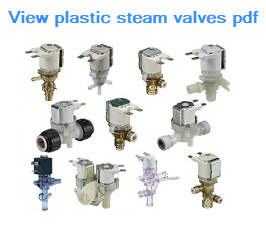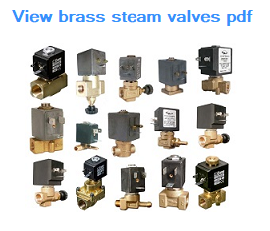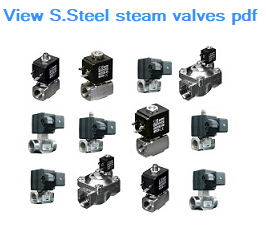Coffee and Steam

Steam is an aggressive media for solenoid valves, reliable operation requires that the design of steam valves takes account of the media and the effect it will have on the valve and its materials of construction.
Steam by its nature is hot and a flow of saturated steam will include water droplets, it may also include particles of lime scale and in the case of autoclaves, used to sterilise medical instruments, residue transferred from the items being cleaned.
Request Industrial brochure with data sheet information.
Brass has historically been the most popular material for steam solenoid valves, and this remains the case for industrial uses such as steam boiler outlets, commercial steam cleaning machines, steam presses in laundries and also professional coffee machines and sterilising systems. However other materials are available, stainless steel solenoid valves are frequently used in the food processing industry, and in recent years the availability of new plastic materials capable of withstanding high temperatures has meant that plastic solenoid valves are now making inroads into the steam market. The advance of plastic solenoid valves for steam is most evident in low steam pressure, low duty cycle consumer applications such as coffee machines and steam irons.
Solenoid valves for steam are available in 2-way and 3-way configurations, predominantly normally closed (power to open), but also in normally open (power to close) form.
Steam solenoid valves may be fitted with one of a number of suitable seal materials. For hot water and low temperature steam EPDM can be used if the temperature will not exceed 150ºC, which equates to a pressure of around 4 bar. For higher temperature applications up to 155ºC FKM can be used. Other seals are glass-filled PTFE (better known as Rulon from Saint-Gobain Performance Plastics) and artificial Ruby seals are available which will work at up to 180ºC which equates to steam at a pressure of 10 bar. Perfluoroelastomers (FFKM) are best known as DuPontTM Kalrez is available as a seal in a few steam solenoid valves permitting a maximum steam temperature of 250ºC. PTFE, and Ruby being rigid materials both lack the flexibility of elastomer seals so do not give a completely steam tight seal when closed.
Brass solenoid valves are prone to suffering from erosion or scoring of the valve’s seat, called wire drawing. This occurs at the point when the valve is almost but not completely closed, the resulting very small, but high velocity flow of steam containing water droplets will, over time, erode or draw a small wire like groove in the seat materials preventing full shut-off and allowing the valve to leak. Wire drawing occurs faster and is more pronounced the higher the differential pressure across the valve. To prevent wire drawing it is recommended that a brass steam solenoid valve should have a stainless steel seats fitted when used in demanding applications.
Solenoid valves for steam are frequently found in locations with a higher ambient temperature, such as within the casing of an autoclave or adjacent to boilers, so the use of solenoid coils with a higher temperature rating for the coil insulation is recommended, accordingly most steam solenoid valves will use a class H coil which is rated to 180ºC.
Other modifications – solenoid valves for steam sterilizers will frequently use a nickel plated armature to avoid a build up of residue and valves for coffee machines will frequently encounter problems with lime scale, for this reason RPE incorporate a special wipe clean feature their steam series valves so that with every operation the sealing face is cleared of lime scale.
Beta Valve have supplied steam solenoid valves for OEM use for over 30 years, produced by ACL srl, RPE srl and Saturn Magnetic snc. The range covers sizes from 1/8” to 1/2” with many types of steam valve available from stock.
Please use the links below to view further details for our products which are most often used in these applications.
Request Call Back to Discuss
More about us



